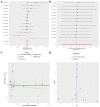No Evidence to Support a Causal Relationship between Circulating Adiponectin Levels and Ankylosing Spondylitis: A Bidirectional Two-Sample Mendelian Randomization Study
- PMID: 36553537
- PMCID: PMC9778096
- DOI: 10.3390/genes13122270
No Evidence to Support a Causal Relationship between Circulating Adiponectin Levels and Ankylosing Spondylitis: A Bidirectional Two-Sample Mendelian Randomization Study
Abstract
Based on previous observational studies, the causal association between circulating adiponectin (CA) levels and ankylosing spondylitis (AS) risk remains unclear. Therefore, this study aims to investigate whether CA levels are related to the risk of AS. We carried out a bidirectional two-sample Mendelian randomization (MR) analysis to examine the causal correlation between CA levels and AS via published genome-wide association study (GWAS) datasets. Single-nucleotide polymorphisms (SNPs) related to CA levels were derived from a large GWAS that included 39,883 individuals of European descent. SNPs related to AS were obtained from the FinnGen consortium (2252 cases and 227,338 controls). The random-effects inverse variance weighted (IVW) method was the primary method utilized in our research. We also used four complementary approaches to improve the dependability of this study (MR-Egger regression, Weighted median, Weighted mode, and Simple mode). Random-effects IVW (odds ratio [OR], 1.00; 95% confidence interval [CI], 0.79-1.27, p = 0.984) and four complementary methods all indicated that genetically predicted CA levels were not causally related to the risk of AS. In reverse MR analysis, there is little evidence to support the genetic causality between the risk of AS and CA levels.
Keywords: Mendelian randomization; ankylosing spondylitis; causal; circulating adiponectin levels; single-nucleotide polymorphisms.
Conflict of interest statement
The authors declare that this study was conducted without any potential conflict of interest.
Figures



References
-
- Mauro D., Thomas R., Guggino G., Lories R., Brown M.A., Ciccia F. Ankylosing spondylitis: An autoimmune or autoinflammatory disease? Nat. Rev. Rheumatol. 2021;17:387–404. - PubMed
-
- Watad A., McGonagle D., Anis S., Carmeli R., Cohen A.D., Tsur A.M., Ben-Shabat N., Bragazzi N.L., Lidar M., Amital H. TNF inhibitors have a protective role in the risk of dementia in patients with ankylosing spondylitis: Results from a nationwide study. Pharmacol. Res. 2022;182:106325. doi: 10.1016/j.phrs.2022.106325. - DOI - PubMed
Publication types
MeSH terms
Substances
LinkOut - more resources
Full Text Sources
Medical
Research Materials

